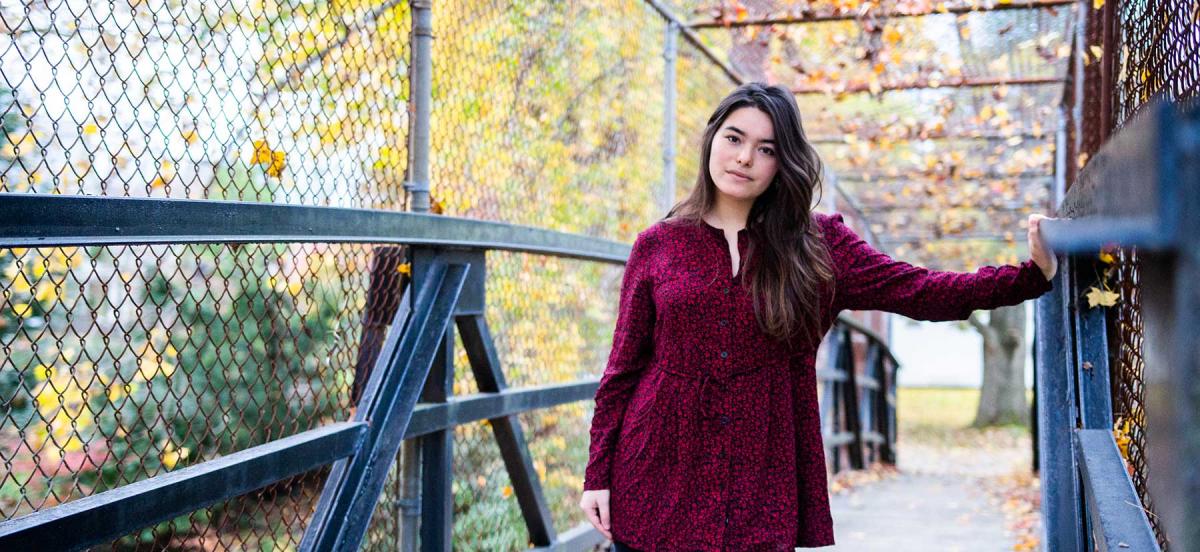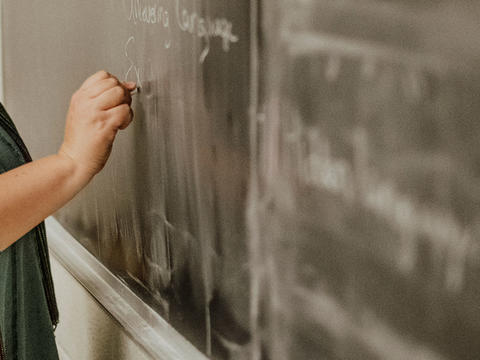Storytelling Through Poetry: An Interview with Caroline Tien ’20

Caroline Tien '20. Photo: Wanyi Yang '20.
Details
HCAH Post-Bac Fellow Courtney Carter '17 interviews student poet Caroline Tien '20 about three of Tien's poems, her creative writing practice, and upcoming plans.
Caroline Tien '20 is an English major concentrating in Creative Writing. In the past year, she has been supported in her creative writing endeavors by the Hurford Center's Student Arts Fund and Margin arts publication. In particular, she enjoys writing poetry, into which she often incorporates historical and mythological figures. Tien was planning to showcase a collection of her poems later this semester in VCAM, including the one selected to be published in Margin this year, but due to the coronavirus-related circumstances, the event had to be cancelled. In an effort to showcase her creative work in another public format, Post-Bac Fellow Courtney Carter '17 interviewed Tien about three of her poems, her creative writing practice, and what she plans to do next. Please enjoy this selection of poems by Caroline Tien, and the conversation they inspired.
The three poems by Caroline discussed in this interview are located at the end of this piece.
Courtney Carter (CC): Thank you for joining me today. Let’s start by talking about these three poems. Where did the ideas for them come from?
Caroline Tien (CT): I believe that people tend to write about things that have captured their imaginations or are personally important to them. Each of these three poems has one or both of those components. The first poem is about Richard the Third, written from his perspective. He’s so villainized in Shakespeare—portrayed as a monster with no moral compass. But I’d say, historically, he’s actually a pretty decent ruler and guy. Shakespeare’s portrayal has really colored our modern conception of him, so the juxtaposition between how he’s presented in literature and who he truly was really fascinated me. The second poem is more personal. Since I was a kid, I’ve loved animals and the outdoors. As a child, my parents considered moving to a rural Massachusetts farm, but they didn’t end up buying it. I had already fallen in love with the place, though—there was a beauty in the countryside wilderness that stayed with me. The third poem is a bit different from my usual style. It actually grew out of an assignment in a creative writing class I took when I was a first-year with Haverford English professor Tom Devaney. The assignment was to write a poem about a sibling. I chose Julian, one of my brothers, who is an avid tennis player. The centerpiece of the poem is my experience witnessing him transform from an amateur—hitting tennis balls against the garage door—into the accomplished athlete he is today.
CC: It seems that in all three poems you bring in characters from elsewhere—historical figures, family members, and gods and goddesses from Greek mythology, among others. What leads you to bring these characters into your poems?
CT: As an English major, history is very important to me. History shares certain storytelling qualities with the subject of English. You could say it’s the story of the past—you have villains, you have heroes, you have betrayal, you have vengeance, et cetera. Similarly, I bring in Greek mythology references, especially from Orpheus, because they tell a story about a small event in an epic way. In my family, too, there is a rich well of anecdotes and images to draw from. When you know them so intimately as people, you want to bring them in as characters. So much of my writing draws from these other storytelling forms.
CC: Can you describe your creative writing process?
CT: I tend to find it difficult to make creative work in a rote kind of way. I really have to get into a “flow” state. I usually start with something that has piqued my interest. Once I do more research on the subject, especially if it is a historical figure or event, I sit down and try to write spontaneously. Then I edit from there. Here’s a fun fact I learned when researching Richard the Third: his body was actually found underneath a car park in Leicester, England, in 2012.
CC: What do you hope readers take away from reading your poems?
CT: This might sound simplistic, but I really just want readers to enjoy what they’ve read—to feel that they’ve enriched their day in some small way, learned a germ of a fact, or been moved somehow.
CC: Do you have any idea what your next creative writing project may be?
CT: I have been applying to some poetry scholarships and submitting to journals, and am hopeful that these opportunities could strengthen and inspire my creative writing. For now, I hope to continue writing about historical and mythological figures, and to find interesting ways to combine family, national, and mythological histories. Who knows!
Here are the three poems by Caroline Tien discussed in this interview.
1.
The Last Stand of Richard Plantagenet
The night before the dreams were bad;
I am told I cried out in my sleep, thrashed my sheets to ribbons,
beat my fists against the bedposts. Now, on the battlefield,
I think on sleep’s lost scenes—a horse wheeling riderless,
the shadow of an ax moving in an arc across the grass—
and am troubled by what they augur. Shall I die today,
the breath beat from my body, my flesh all cut and scored,
my dynasty dissipating to dry history?
There is no time
to wonder. At the sound of the horn,
the men rush upon each other with a roar,
baited to a rage as blind as any that came over the lions of the Roman coliseum
when they spied the first gladiator. I should be praying to the Lord God
as I watch them go down, weeds before a gardener’s scythe,
but instead I pray for myself, for the flesh trembling on my bones,
for the blood pulsing in time with the sound of the war-drum,
for the spine winding its misguided way up my back
in the moments before I raise my sword
and urge my horse forward:
"Oh, my heart, only hammer on!
Give me the courage to conjure orders from this dry throat,
to stare back, if need be, into the winking silver of death’s eye.”
2.
Nostalgia for a Place I Never Lived
I want not grey but green, not the artificial stars
of satellites but the constellations of my childhood—
the Bear, Orion’s belt, the crown of Ariadne.
How is it, then, that I have found myself in the city,
this hub of honking cars and cheap conversation,
where the curbs are crowded with bags of waste
and the roads are as cratered as the faces
of end-stage smallpox patients? I long for the country,
its bleak, cleansing rains. When I was young,
my father almost bought a farm—
a wreck, to be sure, and nothing more,
but I fell in love with it. At night the barn came alive
with a thousand flapping wings of bats;
the owls that nested in the roof-slats
caught our reflections in the pale startled moons
of their eyes. Gone now,
sold up and smashed
with the pitiless claw of a wrecking-ball;
the rooster no longer turns on the weathervane,
a spray of metal rusts in the grass,
the spring rains are pooling on the kitchen floor.
3.
To My Brother, the Tennis Player
I think of your hands first,
nearly twice the size of mine:
“Tigers’ paws,” our father calls them,
a note of pride in his voice.
The sling that quarantines your wrist in cloth
is better than any trophy;
those you have aplenty, anyway,
gold and green figurines that line your shelves
and mingle with the miniature terra-cotta soldiers you bought in China
to form a mismatched army.
Even as a toddler, you found your way onto the clay,
learning to “step, turn, and swing”
as our father might have learned the foxtrot or the tango
in his fifties dance hall.
While your twin and I sat placidly in our strollers,
mouths stoppered with pacifiers,
you menaced the racket with a stare.
You always were the athletic one, after all,
palms calloused from the friction of the grip
long before the knuckles grew hair.
A year or two older than you,
I used to watch you mourn your defeats
with a competitor’s disproportionate grief,
and lie in bed at night listening
to the thump of tennis balls
against the garage door.



